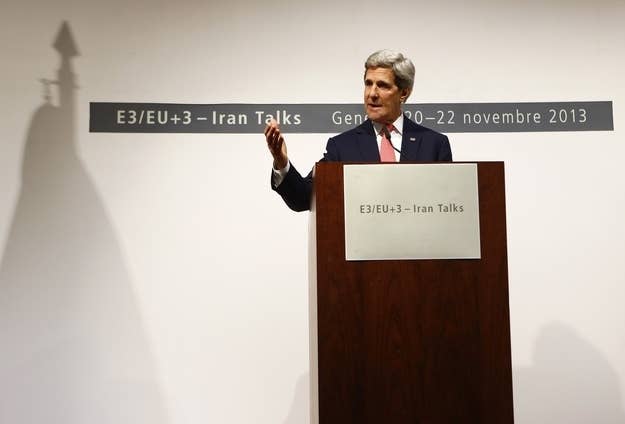
The Obama administration won a hard-fought battle to reach an interim deal with Iran on Sunday in Geneva, but it will immediately face a new challenge in Washington: getting Congress to oblige.
Almost as soon as six world powers had reached an agreement on Iran's nuclear program, angry statements started flying off the Hill from hawkish senators who oppose what they view as a bad deal on Iran.
The six-month agreement with Iran will halt the regime's nuclear program in exchange for some sanctions relief — an estimated $6 to $7 billion — that will be carried out by the administration, without action by Congress.
President Obama was adamant in announcing the deal late Saturday that new sanctions are not an option.
"Now is not the time to move forward on new sanctions, because doing so would derail this promising first step, alienate us from our allies, and risk unraveling the coalition that enabled our sanctions to be enforced in the first place," President Obama said Saturday in a statement from Washington.
But Congressional Republicans gave no sign of stopping efforts to increase sanctions in the immediate aftermath of the deal's announcement.
Sen. Mark Kirk, the Illinois Republican who has spearheaded efforts for stronger sanctions recently and in the past, and been a vocal critic of the administration's Iran movement in recent months, criticized the deal late Saturday.
"I share the president's goal of finding a diplomatic solution to prevent Iran from acquiring a nuclear weapons capability, but this deal appears to provide the world's leading state sponsor of terrorism with billions of dollars in exchange for cosmetic concessions that neither fully freeze nor significantly roll back its nuclear infrastructure," he said in a statement.
"I will continue working with my colleagues to craft bipartisan legislation that will impose tough new economic sanctions if Iran undermines this interim accord or if the dismantlement of Iran's nuclear infrastructure is not underway by the end of this six-month period," Kirk said.
Sen. Marco Rubio sharply criticized the deal, describing an "even more urgent need" for stronger sanctions, and calling the deal a "blow to our allies in the region" in a statement released late Saturday.
"By allowing the Iranian regime to retain a sizable nuclear infrastructure, this agreement makes a nuclear Iran more likely," he said in the statement. "There is now an even more urgent need for Congress to increase sanctions until Iran completely abandons its enrichment and reprocessing capabilities.
"This agreement shows other rogue states that wish to go nuclear that you can obfuscate, cheat, and lie for a decade, and eventually the United States will tire and drop key demands," he continued in the statement.
Some on the Hill are determined to push forward with sanctions even though the interim deal was attained.
Sanctions will be voted on when the Senate returns from recess next month, a senior Senate aide told BuzzFeed late Saturday. The president should expect bipartisan enforcement legislation on his desk before Christmas, according to the aide, who described the deal as a shift for Congress from bulldog to watchdog.
"There's no question that members of Congress genuinely believe that Iran sanctions must be increased," a congressional aide told BuzzFeed Saturday. "Congress will move forward because Congress believes that, at the very least, after six months, if Iran doesn't do what we need them to do, Congress will drop the hammer."
"Definitely when six months comes up, the administration will have no leeway with Congress," the aide said.
The question is whether or not the various pieces of legislation being considered will actually be brought to a vote or whether leadership will smother such efforts.
Senate Majority Leader Harry Reid said Thursday he would support a vote on stronger sanctions after the Thanksgiving recess.
"The Senate must be prepared to move forward with a new bipartisan Iran sanctions bill when the Senate returns after Thanksgiving recess. And I am committed to do so," Reid said. "I believe we must do everything possible to stop Iran from getting nuclear weapons capability."
How the agreement with Iran and the president's emphasis on the imposition of no new sanctions will affect Reid's position is unclear.
Stronger sanctions on Iran have been an ongoing point of contention the last few years between the Hill and the White House, perhaps most sharply bubbling over earlier this month following a disastrous meeting between the Senate Banking Committee and Secretary of State John Kerry.
The push for stronger sanctions has not been solely a Republican effort, either. In fact, support for stronger sanctions has been a rare point of bipartisan legislative action in the last few years. New Jersey Democrat and Senate Foreign Relations Chair Sen. Bob Menendez has been a vocal proponent of tougher sanctions.
The administration isn't giving any sign they will back down. In remarks made in Geneva after the deal was first announced, Kerry threatened a possible veto of new sanctions.
"Ultimately, if somehow we wound up not agreeing and Congress took action, the president has the possibility of a veto," he said.
Kerry said he is looking forward to "working together with Congress in order to achieve the goal that Congress embraced when it put these sanctions in place in the first place."

